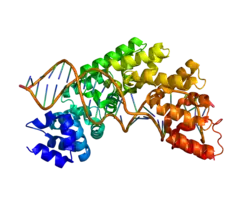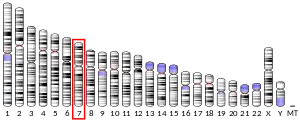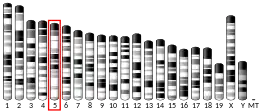| MTERF1 | |||||||||||||||||||||||||||||||||||||||||||||||||||
|---|---|---|---|---|---|---|---|---|---|---|---|---|---|---|---|---|---|---|---|---|---|---|---|---|---|---|---|---|---|---|---|---|---|---|---|---|---|---|---|---|---|---|---|---|---|---|---|---|---|---|---|
 | |||||||||||||||||||||||||||||||||||||||||||||||||||
| |||||||||||||||||||||||||||||||||||||||||||||||||||
| Identifiers | |||||||||||||||||||||||||||||||||||||||||||||||||||
| Aliases | MTERF1, MTERF, mitochondrial transcription termination factor 1 | ||||||||||||||||||||||||||||||||||||||||||||||||||
| External IDs | OMIM: 602318 MGI: 3704243 HomoloGene: 5073 GeneCards: MTERF1 | ||||||||||||||||||||||||||||||||||||||||||||||||||
| |||||||||||||||||||||||||||||||||||||||||||||||||||
| |||||||||||||||||||||||||||||||||||||||||||||||||||
| |||||||||||||||||||||||||||||||||||||||||||||||||||
| |||||||||||||||||||||||||||||||||||||||||||||||||||
| |||||||||||||||||||||||||||||||||||||||||||||||||||
| Wikidata | |||||||||||||||||||||||||||||||||||||||||||||||||||
| |||||||||||||||||||||||||||||||||||||||||||||||||||
Mitochondrial transcription termination factor 1, also known as MTERF1, is a protein which in humans is encoded by the MTERF gene.[5][6][7][8]
This gene encodes a mitochondrial transcription termination factor. This protein participates in attenuating transcription from the mitochondrial genome; this attenuation allows higher levels of expression of 16S ribosomal RNA relative to the tRNA gene downstream. The product of this gene has three leucine zipper motifs bracketed by two basic domains that are all required for DNA binding. There is evidence that, for this protein, the zippers participate in intramolecular interactions that establish the three-dimensional structure required for DNA binding.[5]
References
- 1 2 3 GRCh38: Ensembl release 89: ENSG00000127989 - Ensembl, May 2017
- 1 2 3 GRCm38: Ensembl release 89: ENSMUSG00000053178 - Ensembl, May 2017
- ↑ "Human PubMed Reference:". National Center for Biotechnology Information, U.S. National Library of Medicine.
- ↑ "Mouse PubMed Reference:". National Center for Biotechnology Information, U.S. National Library of Medicine.
- 1 2 "Entrez Gene: MTERF mitochondrial transcription termination factor".
- ↑ Daga A, Micol V, Hess D, Aebersold R, Attardi G (April 1993). "Molecular characterization of the transcription termination factor from human mitochondria". J. Biol. Chem. 268 (11): 8123–30. doi:10.1016/S0021-9258(18)53070-2. PMID 7681833.
- ↑ Asin-Cayuela J, Helm M, Attardi G (April 2004). "A monomer-to-trimer transition of the human mitochondrial transcription termination factor (mTERF) is associated with a loss of in vitro activity". J. Biol. Chem. 279 (15): 15670–7. doi:10.1074/jbc.M312537200. PMID 14744862.
- ↑ Asin-Cayuela J, Schwend T, Farge G, Gustafsson CM (July 2005). "The human mitochondrial transcription termination factor (mTERF) is fully active in vitro in the non-phosphorylated form". J. Biol. Chem. 280 (27): 25499–505. doi:10.1074/jbc.M501145200. PMID 15899902.
Further reading
- Daga A, Micol V, Hess D, et al. (1993). "Molecular characterization of the transcription termination factor from human mitochondria". J. Biol. Chem. 268 (11): 8123–30. doi:10.1016/S0021-9258(18)53070-2. PMID 7681833.
- Maruyama K, Sugano S (1994). "Oligo-capping: a simple method to replace the cap structure of eukaryotic mRNAs with oligoribonucleotides". Gene. 138 (1–2): 171–4. doi:10.1016/0378-1119(94)90802-8. PMID 8125298.
- Fernandez-Silva P, Martinez-Azorin F, Micol V, Attardi G (1997). "The human mitochondrial transcription termination factor (mTERF) is a multizipper protein but binds to DNA as a monomer, with evidence pointing to intramolecular leucine zipper interactions". EMBO J. 16 (5): 1066–79. doi:10.1093/emboj/16.5.1066. PMC 1169706. PMID 9118945.
- Suzuki Y, Yoshitomo-Nakagawa K, Maruyama K, et al. (1997). "Construction and characterization of a full length-enriched and a 5'-end-enriched cDNA library". Gene. 200 (1–2): 149–56. doi:10.1016/S0378-1119(97)00411-3. PMID 9373149.
- Sanger Centre, The; Washington University Genome Sequencing Cente, The (1999). "Toward a complete human genome sequence". Genome Res. 8 (11): 1097–108. doi:10.1101/gr.8.11.1097. PMID 9847074.
- Strausberg RL, Feingold EA, Grouse LH, et al. (2003). "Generation and initial analysis of more than 15,000 full-length human and mouse cDNA sequences". Proc. Natl. Acad. Sci. U.S.A. 99 (26): 16899–903. Bibcode:2002PNAS...9916899M. doi:10.1073/pnas.242603899. PMC 139241. PMID 12477932.
- Scherer SW, Cheung J, MacDonald JR, et al. (2003). "Human chromosome 7: DNA sequence and biology". Science. 300 (5620): 767–72. Bibcode:2003Sci...300..767S. doi:10.1126/science.1083423. PMC 2882961. PMID 12690205.
- Hillier LW, Fulton RS, Fulton LA, et al. (2003). "The DNA sequence of human chromosome 7". Nature. 424 (6945): 157–64. Bibcode:2003Natur.424..157H. doi:10.1038/nature01782. PMID 12853948.
- Asin-Cayuela J, Helm M, Attardi G (2004). "A monomer-to-trimer transition of the human mitochondrial transcription termination factor (mTERF) is associated with a loss of in vitro activity". J. Biol. Chem. 279 (15): 15670–7. doi:10.1074/jbc.M312537200. PMID 14744862.
- Prieto-Martín A, Montoya J, Martínez-Azorín F (2004). "Phosphorylation of rat mitochondrial transcription termination factor (mTERF) is required for transcription termination but not for binding to DNA". Nucleic Acids Res. 32 (7): 2059–68. doi:10.1093/nar/gkh528. PMC 407814. PMID 15087485.
- Gerhard DS, Wagner L, Feingold EA, et al. (2004). "The status, quality, and expansion of the NIH full-length cDNA project: the Mammalian Gene Collection (MGC)". Genome Res. 14 (10B): 2121–7. doi:10.1101/gr.2596504. PMC 528928. PMID 15489334.
- Asin-Cayuela J, Schwend T, Farge G, Gustafsson CM (2005). "The human mitochondrial transcription termination factor (mTERF) is fully active in vitro in the non-phosphorylated form". J. Biol. Chem. 280 (27): 25499–505. doi:10.1074/jbc.M501145200. PMID 15899902.
- Hyvärinen AK, Pohjoismäki JL, Reyes A, et al. (2007). "The mitochondrial transcription termination factor mTERF modulates replication pausing in human mitochondrial DNA". Nucleic Acids Res. 35 (19): 6458–74. doi:10.1093/nar/gkm676. PMC 2095818. PMID 17884915.
This article is issued from Wikipedia. The text is licensed under Creative Commons - Attribution - Sharealike. Additional terms may apply for the media files.




